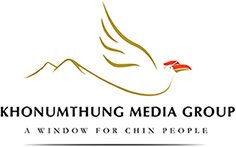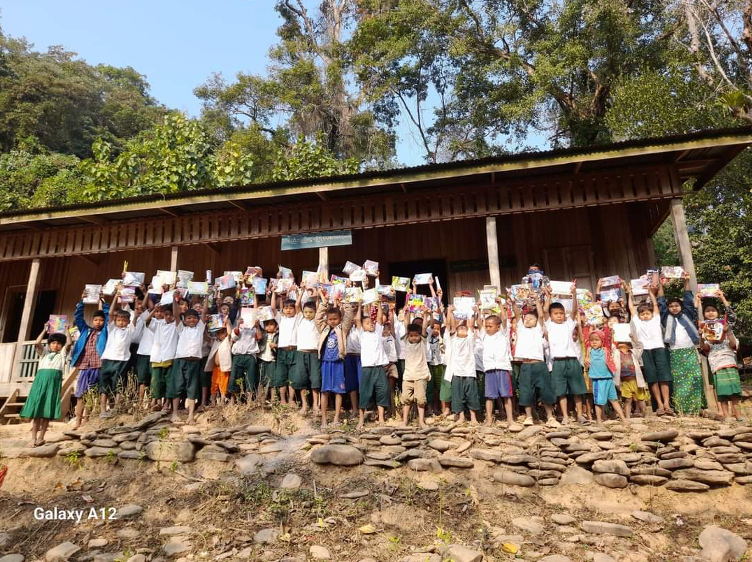An interview with John Bosco, Chairman of the Paletwa Township Education Board, about current challenges the interim community-based schools are facing
Under the leadership of the Paletwa Township Education Board, interim community-based schools were first established on 1 July 2022, and they’ve been running for over two years now.
Currently, over 100 schools have been opened in some areas under the control of the Paletwa Council and in displacement persons’ camps on the Indian-Myanmar border, with more than 7,000 students studying. Paletwa Township, which is under the control of the Arakha Army (AA), is reportedly facing significant challenges in implementing interim education.
They are dealing with a lot of difficulties, including insufficient teachers, lack of teaching materials, and challenges in providing monthly allowances to teachers. Given these circumstances, Khonumthung Media Group (KMG) interviewed John Bosco, Chairman of the Paletwa Township Education Board.
Q: When and how did you form the Paletwa Township Education Board?
A: We received guidance from the NUG government. We formed the Paletwa Township Education Board in April 2022 to facilitate the opening of interim community-based schools in the township.
At that time, the Paletwa Autonomous District Council – now called Paletwa Council – provided guidelines after discussions with community leaders. They outlined who should be included in the board. We collectively formed the board with CDM teachers, university students, community elders, and supporters of the revolution.
Q: Can you tell us current activities of the Paletwa Township Education Board?
A: We opened public schools within the Paletwa Council’s administrative control areas with guidance from the NUG government’s Ministry of Education and through coordination with Chinland Government meetings.
Our main focus is to provide guidance that can guarantee their education. Then, with the support of the community, including parents, we provide necessary materials for the school and allowances for the teachers. We can also facilitate to open schools in villages where parents want them for their children.
Q: Can you also tell us about Paletwa Township Education Board’s implementation of interim education in Paletwa Township after the military coup?
A: Before the coup, there were around 380 to 400 schools in the entire township. After the 2021 coup, many children no longer wanted to go to the junta-run schools. Many children were displaced. With a significant number of children the CDF – Paletwa’s areas of operation, we set up community-based schools with the aim of preventing interruption in their education and creating a pathway from interim education to federal education.
We formed the Education Board in 2022. Before that, we were providing education in IDP schools and in villages where resistance forces were active, though not in a fully systematized manner. After forming the education board, we consulted with parents, school administrative bodies, and defense groups to determine which villages wanted to open schools and how to do so, and then we opened schools accordingly.
Q: In which areas and how many villages in Paletwa Township are you currently implementing interim education?
A: There are no more junta soldiers in Paletwa Township —it’s like a liberated territory. But, we have two armed groups: CDF-Paletwa and the Arakha Army (AA). In AA-controlled areas, we currently can’t fully operate our system. We’ve divided the region into four areas: Paletwa area, Samee area, Meezar area, and Than Htaung area. Among these, we can only operate in the Samee area, but not at full capacity. This is because in AA-administered areas, we’re not permitted to implement education initiatives – they simply don’t grant us permission.
In the Paletwa area, we can’t operate at all. In the Meezar area, many children have been displaced to Mizoram. We can only open about 4 or 5 schools there. In the Than Htaung area, we can open around 20 schools. Out of nearly 400 schools in the entire Paletwa Township, we can currently operate just over 96 schools. Around 300 schools remain beyond our reach. This is because in ULA/AA -controlled territories, we can’t implement our education system.
Q: How many students and teachers are there at the moment?
A: In the 2024-2025 academic year, we have managed to open 107 schools, including 8 high schools. We’ve also opened 11 schools for displaced people in Mizoram, coordinating with the education board. In these 107 schools, we have over 7,000 students, although we have yet to receive data from some of them. Currently, we’re running the schools with over 500 teachers.
Q: Are the number of students and teachers sufficient? What challenges are you facing in implementing interim education, and how are you addressing these challenges?
A: Over 500 teachers is actually not sufficient. In Paletwa, where the number of CDM staff is quite low, we’re facing significant challenges in teaching. While we can make some progress with the teachers we have, our biggest challenge is that we can’t provide them with financial support. We also have youth who support the revolution and university students who have stopped their studies contributing with us.
If local community members don’t participate, the schools simply can’t operate. So, young people are stepping up to help the children in their community. But, when they don’t receive financial support, they don’t have time for teaching alongside other work. We can’t provide allowances, and the parents and community members have no income to support this. This creates significant long-term challenges about how to sustain this effort. We have to convince them even to stay until the end of the 2024-2025 academic year.
Another issue is teaching aids. We can’t buy printed books anywhere. We don’t have the resources to print them ourselves. That’s why we have challenges in teaching. At the same time, we can’t get school supplies and stationeries anywhere in the area. Even to buy a pen, pencil, or blank notebooks, we have to go to Hnaring in northern Chin State. The transportation is extremely difficult. It costs around 800,000 kyat to hire a motorcycle from Paletwa to Hnaring, and that’s just the cost for one way. So the transportation cost is even higher than the cost of the materials we want to buy.
We face many challenges like this because not everyone has a motorcycle. As a result, we can’t provide teaching materials and school supplies for the children. We have many challenges like this. For this, some villages get support from their family members like brothers and sisters working abroad. Some villages don’t get any support at all. We also try to get support from some NGOs as much as we can. With the money and donations, we receive, we can provide some support for teaching materials and small allowances for teachers. But we can’t do much with it.
Q: Are there any organizations that provide regular support to the Paletwa Township Education Board?
A: There aren’t any organizations that provide regular support. In 2023, we received a project from the Chin Human Rights Organization (CHRO), but it didn’t cover the entire township. They supported about 20 villages for one year. Through that, we received some teaching support materials and writing supplies. As for teacher allowances, they only provided one teacher per school. That’s around 185,000 kyats. So if a school has multiple teachers, each would only receive about 20,000 kyats. That project has now ended. We don’t have any organizations which have consistently provided financial assistance.
Q: What are the current urgent needs?
A: Since more than half of the academic year has passed, we still need teaching support materials. Not just for this year, but for next year as well. As for urgent needs next year, we will need a lot of teaching supplies. At this moment, the main need is to prioritize teacher allowances. This is because even when we try to seek help from those living abroad, they can’t often help.
What happens next if the teachers continue without support? Some of them have voiced that they can’t go on like that without support. If only we can provide teacher stipends, it will at least help keep this education system functioning.
Q: Has the AA’s control over Paletwa Township posed any challenges in implementing the interim education?
A: Since we are connected with the NUG, we want to connect with almost every village in Palatwa Township. But, to make such connections, we can’t go to their areas, they don’t allow us to enter. From what I’ve heard, it seems that ULA/AA will start implementing their education system from 2025 onwards. I’ve heard they will even use their own curriculum.
In such a situation, we are not yet able to decide how we will continue and what we will do. They want to collaborate with our education implementation, but they also want to teach Arakanese language, which the people here don’t like. People don’t want to learn Arakanese language; they want to learn in their own language. They have been in contact with us. We do have plans to meet with their education committee to discuss how we can move forward. But we can’t tell about the details yet.
Q: What do you think about the AA’s intentions to implement Arakha education system in Paletwa?
A: In fact, for their goal of establishing an Arakha nation, they should implement their language and education in their administered area or their state. To be frank, if they do it in some Paletwa areas where Arakanese people live, we wouldn’t be talking it this much.
The challenge is that Palatwa Township is in Chin State, so we would have to follow the Chin State’s education system. We don’t want Arakanese language to be taught in Chin areas, including areas with Chin ethnic people, nor do we want them to promote their national identity. That would be unacceptable.
Q: What else would you like to add?
A: In the interim period, if we want to strengthen education, we need an organization that can help us with our challenges. Otherwise, our education system will be very difficult to operate. If education discontinue, we will become an uneducated people, and we will face more oppression and lives will worsen. So we appeal for your support to strengthen our education.


